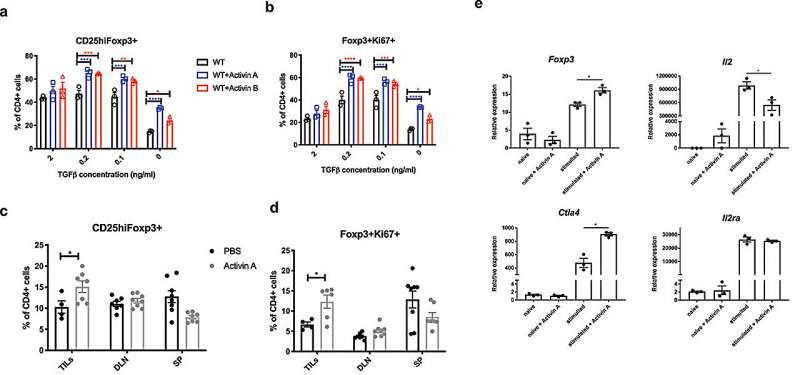This article has been reviewed according to Science X's editorial process and policies. Editors have highlighted the following attributes while ensuring the content's credibility:
fact-checked
trusted source
proofread
Immune cell receptor provides promising immunotherapy target

Drugs that target a receptor on immune cells called activin receptor 1C may combat tumor-induced immune suppression and help patients' immune systems fight back against cancer, according to a study by investigators at the Johns Hopkins Kimmel Cancer Center and its Bloomberg~Kimmel Institute for Cancer Immunotherapy.
The study, published in Oncoimmunology, identifies a new strategy cancer cells use to protect themselves from immune system attack, and suggests treatments that could counteract it.
It shows that tumor cells and some immune cells produce proteins called activins that cause immune cells called CD4+ T helper cells—which send signals to other immune cells to destroy infectious particles—to transform into another type of T cell (regulatory T-cells, or Tregs), which performs the opposite function, suppressing immune system activity.
However, blocking activin receptor 1C on CD4+ T cells helps prevent the accumulation of immune-suppressing Tregs in tumors and slows tumor growth.
"We have identified a new target for anticancer immunotherapy," says the study's senior investigator, Drew Pardoll, M.D., P.h.D., director of the Bloomberg~Kimmel Institute for Cancer Immunotherapy and professor of oncology at the Johns Hopkins University School of Medicine. "Our discovery could lead to an entirely new class of immunotherapies that may enhance the effects of existing cancer therapies and further personalize cancer care."
Tregs are essential in preventing the immune system from attacking the body's cells and causing autoimmune diseases. But tumors co-opt this normally protective cell to defend themselves against destruction by the immune system, suppressing the body's built-in defenses to cancer. Patients with more Tregs have worse cancer outcomes, but studies in mice have shown that blocking Tregs inhibits tumor growth, and reducing Treg numbers causes tumors to shrink.
About a decade of research by Johns Hopkins researchers on the role of a transcription factor called YAP in Treg production in tumor cells led to the discovery that YAP boosts activin receptor 1C numbers on Tregs. The fact that this receptor only occurs on cells produced in the bone marrow, such as immune or blood cells, reduces the likelihood of harmful off-target effects.
In the study, the investigators demonstrated that mice genetically engineered to lack the activin receptor 1C are healthy, able to reproduce, and naturally resistant to tumor growth. Treating mice with an antibody that blocks the receptor also had anticancer effects. When combined with antibodies to a second inhibitory immune receptor, PD-1, which is used clinically to treat many cancers, the antibody had an even greater impact on tumors, even those that do not usually respond to anti-PD-1 therapies.
Because the human activin receptor 1C is almost identical to the mouse activin receptor 1C, Pardoll is hopeful that similar efficacy will be achieved in humans. The similarity will also help expedite preclinical studies testing anti-activin receptor 1C antibody therapy candidates. Pardoll and colleagues are partnering with Immunomic Therapeutics to develop several potential candidate antibodies.
"We hope to have an antibody available for clinical trials in 2025," he says.
If clinical trials are successful, the anti-activin receptor 1C antibodies could be a potent addition to the arsenal of anticancer drugs. Combining them with PD-1 inhibitors could improve treatment effectiveness. Pardoll explains that blood tests can identify patients with high levels of activin who may be more likely to benefit from anti-activin receptor 1C antibody therapies, allowing more precise identification of patients likely to benefit from the therapy.
More information: Ying Zheng et al, Targeting the activin receptor 1C on CD4+ T cells for cancer immunotherapy, OncoImmunology (2024). DOI: 10.1080/2162402X.2023.2297503

















